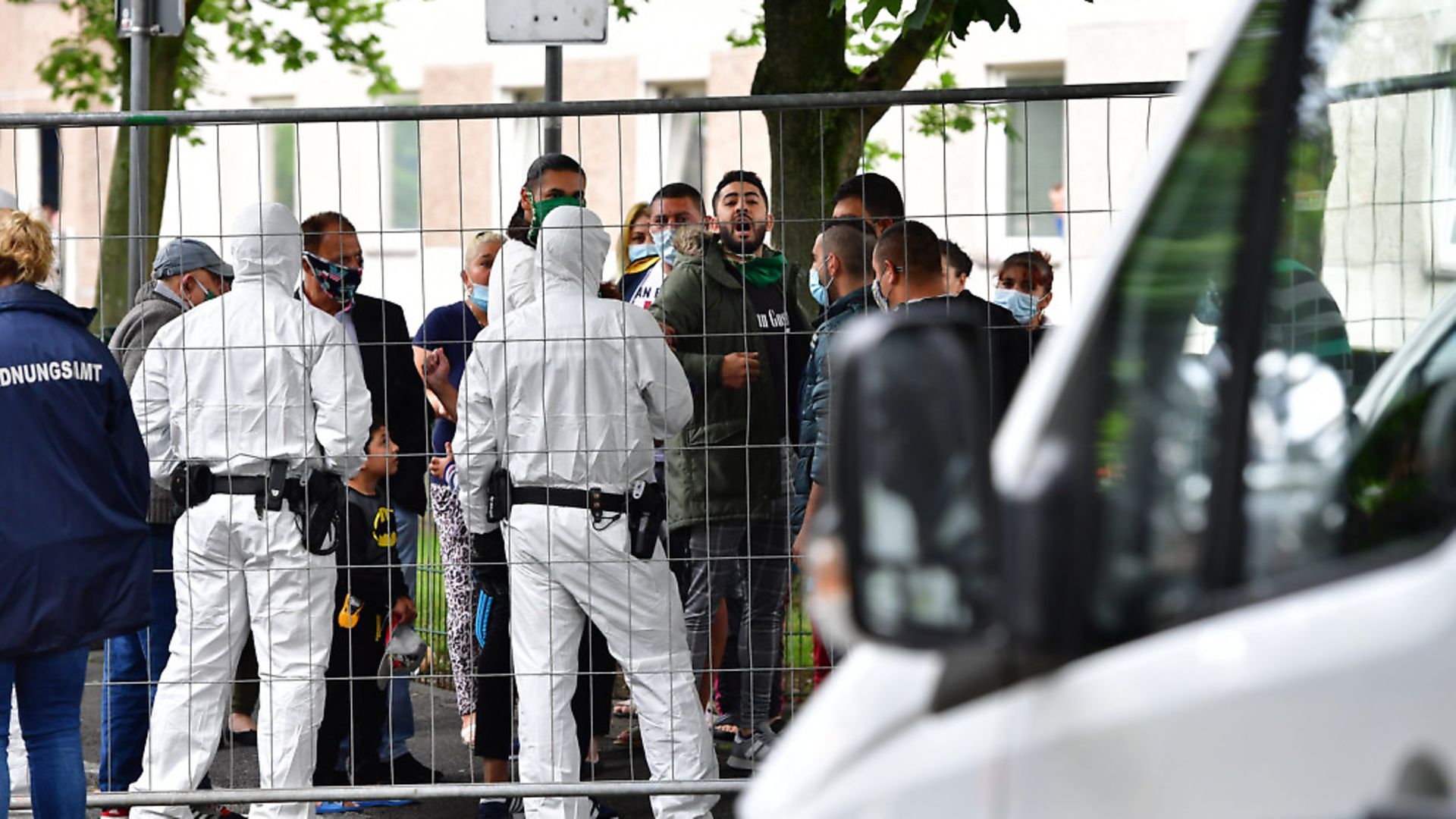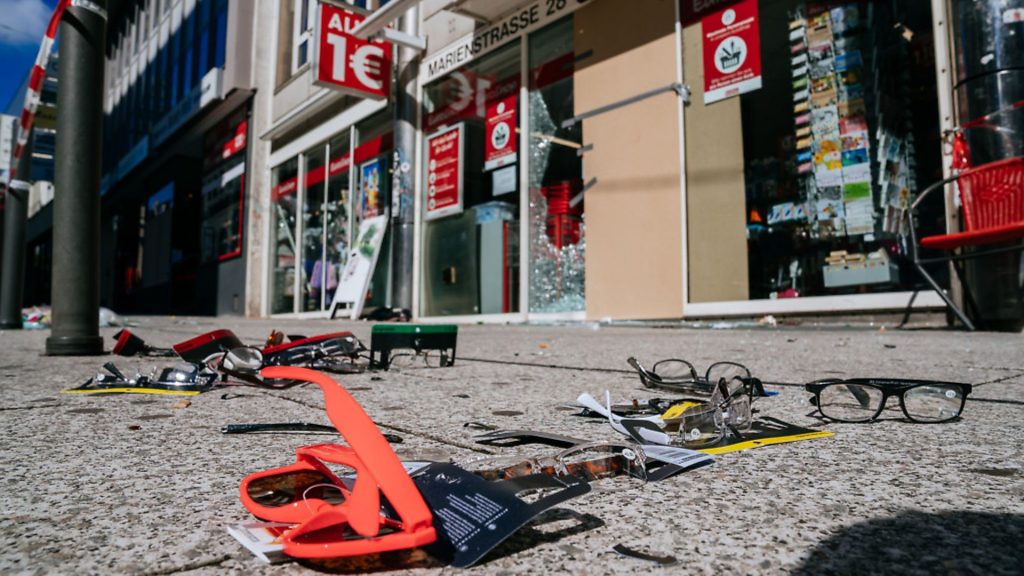
Infection rate rises, riots, looting, attacks on police, illegal partying and attempted quarantine breakouts… What is going on in the country considered Europe’s most sensible? Cathrin Schaer reports

Dawn on a sunny Monday morning and in a central Berlin park, a crowd of about 20 are the last remnants of an illegal party that has been going since Saturday night. A young man with bleached blond hair throws his head back and laughs loudly, before enthusiastically embracing the man sitting beside him on the grass.
A young woman wearing nothing but cut-off denim shorts and two crosses of black tape over her nipples begins to sway to an imaginary beat. Somebody else in the group claps. Another raises an early-morning beer. Cheers! Welcome to the apparent end of Germany’s coronavirus-related lockdown.
At the same time that this illegal Berlin techno party, attended by anywhere between 500 and 1,000 revellers, was getting started, another gathering in a park in southern Germany was moving in a more explosive direction.
Bars and clubs are still closed in Stuttgart and local youths have been meeting in a central city park, the Schlossgarten, for several weeks now to drink, socialise and play music. The more restrictions were relaxed, the more people gathered on the lawns.
That Saturday, June 21, some of the police patrolling the park stopped to ask a young man about drugs and when he resisted them, others came to his defence. The small stand-off turned into a major riot. Several hundred mostly young men rampaged down Stuttgart’s main shopping thoroughfare, throwing bottles and bricks at police, smashing store windows and looting.
The night ended with 27 arrests, 32 police injured and a slew of international headlines. ‘It was like a civil war,’ one horrified conservative commentator wrote.
Even earlier that night, the police had already come under attack elsewhere, in the central German city of Göttingen. The previous Thursday, local authorities there had enforced quarantine at several high-rises to contain Covid outbreaks; the buildings were surrounded by temporary construction site fencing and patrolled by baton-wielding officers.
On Saturday, up to 200 of the 700 estimated residents armed themselves with pieces of bottles, metal rods, stones and fireworks and tried to break through the fences and out of quarantine. Police stopped them by using teargas, including on children, to contain the breakout. In that case, one man was arrested and eight police were injured.
So what do these incidents from one wild Saturday night mean for Germany as it loosens pandemic restrictions?
In general the country’s lockdown was never as strict as that in places like Spain, Italy and France, and was based upon the citizenry’s assumed predilection for following the rules, taking personal responsibility and community-mindedness. But do these incidents perhaps show the limits of restrictions that can be placed on citizens in a democracy, no matter how well behaved they usually are? Could it be that the natives in this normally staid bastion of European unity are losing it?
Unfortunately for those hoping for a bit of schadenfreude, the short answer is: No, not really. ‘In my eyes, these kind of events have always occurred from time to time in Germany,’ says Jutta Allmendinger, a professor of sociology and the president of the WZB Berlin Social Science Centre, which has been running a digital forum on the social impacts of the virus. ‘I would not connect them all to the pandemic per se. That is not to say that our societies aren’t under stress at the moment. Each and every one of us has to deal with a situation that is entirely new to us. In general though, I think people in Germany have tried to follow the rules and do their share to limit the spread of the virus,’ Allmendinger said.
‘I think people generally have the feeling that politicians and decision-makers know what they are doing,’ she added, citing swift government reactions to the latest Covid-19 outbreaks – while most of Germany remains stable in terms of infections, there are several new hotspots in North Rhine Westphalia. ‘Also the massive economic stimulus package the German government has introduced shows that the ambition is there to help as many parts of society as possible,’ Allmendinger adds.
‘A democracy can never be based on the principle of controlling the demos,’ she concludes. ‘Healthy democratic societies are based on trust.’
Various polls and surveys support that impression. Although different approaches in different German states have led to some confusion about what is allowed where, and have also caused political tensions between federal authorities, who prefer to ease lockdowns more slowly, and state ministers, who want to speed things up, the most recent YouGov polls find that 71% of Germans still approve of their government’s handling of the health crisis.
That’s far above Spain, France and the UK, all of whom sit between 40% and 50% approval. The latest polls also conclude that around three-quarters of Germans support re-locking districts down, where there have been serious new virus outbreaks, as in North Rhine Westphalia.
In general, the public seems to believes that their leadership is being honest with them. Chancellor Angela Merkel’s Christian Democrats remain more popular than they have been for years. If elections were to be held shortly they would get 37% of the vote, surveys suggest.
Germans’ infamous sense of righteousness remains strong. As Christian Stoecker, a psychology professor who teaches digital communication, wrote in his column in Der Spiegel magazine recently: ‘Current developments in Brazil, Great Britain and the USA appear to confirm one thing: The [populist] politics of lying don’t work when people are dying.’
The detailed dissection of disturbing events, post-riot, also appears to support the theory of German stability in a crisis. The incidents of that Saturday night were quickly followed by a week of political hand-wringing, a raft of editorials and a lot of intellectual analyses about what could have gone so wrong, by experts in everything from the sociology of protest movements and extremism, to virology, youth psychology and criminology.
Was there a trend in youthful violence toward the police? one local newspaper asked and concluded, after looking at statistics, that there was not. Violence against police had risen by 9% between 2018 and 2019, they found, but the number of younger offenders in that class of crime remained steady over the years, at about a third.
Rather than politics or a lack of faith in the German government or police, illicit outdoor parties in Berlin, Stuttgart and also in Hamburg, were mostly blamed on youthful frustrations about nightclubs, bars and even sports clubs still being closed.
In Stuttgart, things likely got out of control thanks to alcohol, opportunism and weeks of rising tensions between the locals and police patrolling the central city park, authorities concluded. There had already been some minor clashes in the past. Perhaps, one commentator theorised, the kids also sympathised with similarly outraged anti-authority demonstrators they saw on TV, from the Black Lives Matter protest movement in the US.
The merits of video surveillance or an alcohol ban were debated but neither were instituted. A discussion about racism in German law enforcement is ongoing.
Decisive moves were made. In Stuttgart, there was an increased police presence in the park the next weekend and most of the young people who gave interviews declared the riot an oddity, a one-off. They don’t bother me, one young woman told a reporter from Der Spiegel magazine about the police: ‘I know nothing will happen to me.’ In Berlin, the merry-making hipsters usually leave the park peacefully with their boomboxes when the police ask them to. One of the organisers even brings rubbish bags and says they make sure to pick up after themselves.
And in Göttingen, the potential lockdown escapees were placated after the local mayor held talks with residents’ representatives. The quarantine has since been lifted for most of the apartment’s inhabitants – the last day was June 25.
Several other enforced quarantines have since been placed on whole apartment blocks, mostly in Berlin. However, after the events in Göttingen, nobody was erecting fences or calling in the troops. ‘We’ve learned a lot,’ a city councillor in one of the affected districts, Neukölln, told local media.
The emphasis is on social work and communication, he said. In fact, passing by the apartment block in question late last week, the only evidence of any quarantine were letters posted on all of the building doors, warning about the dangers of Covid-19 in several languages. Police are supposed to drive by infrequently to monitor the situation but apparently the only time they were called in officially was when residents started throwing eggs and potatoes at journalists standing on the street, who were trying to report on the alleged ‘plague house’.
Germany’s simmering summer has, it seems, gone off the boil again.









